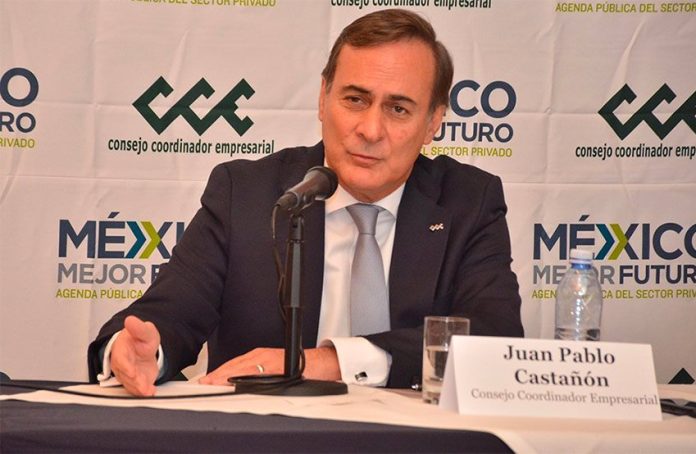The United States’ announcement yesterday of new metal tariffs on key trade partners Mexico and Canada didn’t deliver a knockout blow to an updated trade agreement but it certainly made negotiations more complicated than they were.
Mexican President Enrique Peña Nieto and Canadian Prime Minister Justin Trudeau condemned the move to impose duties of 25% on steel and 10% on aluminum, but both also renewed their commitment to what the Canadian Press described as “the bare-knuckled NAFTA renegotiation” process.
The importance of the North American Free Trade Agreement to both countries meant that they couldn’t afford to be deterred despite heavy-handed tactics by the U.S., the news agency said.
Peña Nieto’s office issued a statement to say that the president held a telephone conversation with his Canadian counterpart yesterday, during which the two leaders expressed their disappointment with the tariff decision and discussed retaliatory measures. But they also reiterated their commitment to achieving a successful modernization of NAFTA.
Trudeau’s office released a similar statement affirming that the leaders “agreed to continue working toward a mutually beneficial [NAFTA] outcome.”
But United States President Donald Trump doesn’t appear to be on the same page.
U.S. Commerce Secretary Wilbur Ross said the decision to impose the tariffs was based on a lack of progress in NAFTA talks, although he added that neither the U.S. measures nor Mexico and Canada’s retaliatory measures would affect the ability to continue negotiating a new trilateral treaty.
The president of Mexico’s influential Business Coordinating Council (CCE) has a different view.
In a television interview, Juan Pablo Castañón said Trump’s decision to impose new protectionist measures on its North American trade partners and the consequent imposition of tit-for-tat tariffs have placed NAFTA negotiations “in serious difficulties.”
In Canada, Jean Simard, president of the Canadian Aluminum Association, advocated terminating negotiations altogether, saying “it’s hard to imagine how you negotiate with a knife to your throat.”
Castañón added that he supported the government’s decision to impose reciprocal measures because Mexico “cannot remain silent in the face of this kind of attack” considering that the two countries are trade partners and in the middle of a negotiation process.
He didn’t rule out Mexico modifying the list of United States products that will be subject to tariffs but clarified that any such move would only come in response to U.S. aggression because Mexico’s strategy is to respond rather than strike first.
The business leader charged it would be “very difficult” to reach a new agreement before the July 1 elections but said it may be possible to do so between then and the United States midterm elections in November.
However, leading American trade lawyer Dan Ujczo said the window for serious NAFTA negotiations has closed for 2018 due to the electoral processes in both countries.
Mexico’s central bank is also pessimistic about reaching a new NAFTA deal this year, warning that talks could drag on until 2019 and consequently impact “even more” on investment and public and private spending.
That assessment, gleaned from the minutes of a Bank of México meeting held before the new tariffs were announced, acknowledged that talks have continued to stall despite repeated indications from leaders and officials in all three NAFTA countries that a deal was close.
A proposed meeting between Trump, Trudeau and Peña Nieto this week that could have potentially led to the signing of an agreement in principle was cancelled because the United States insisted that the Canadian prime minister first agree to a so-called sunset clause.
Trudeau told reporters yesterday that he thought the three countries were “quite close to reaching an agreement and perhaps the time had come” for the three leaders to sit down in Washington to finalize the NAFTA deal.
“We already had the bones of a very good agreement for all parties, and I thought it might be opportune for all of us to sit down for a few hours and discuss it,” the prime minister said, adding that Trump appeared to like the idea.
But Trudeau said he received a call from U.S. Vice-President Mike Pence Tuesday saying that the White House was happy to host the proposed summit but only on the condition that Trudeau — and presumably Peña Nieto — agreed to the provision that would see NAFTA automatically terminated after a five-year period if the three countries didn’t negotiate to renew it.
Trudeau said he had answered that “unfortunately, if that was a precondition to our visit, I was unable to accept.”
The sunset clause is one of a range of issues on which the three countries have been unable to reach a consensus.
Others include rules of origin and wages in the automotive sector, access to government procurement markets and a United States proposal to eliminate settlement dispute panels.
The Bank of México said the value of the peso against the US dollar is one of the variables that will suffer the most amid the continuing uncertainty surrounding the deal and that inflationary pressure could follow.
Some analysts said last month that the Mexican peso could trade at up to 22 to the US dollar before the presidential election.
Source: Milenio (sp), The Canadian Press (en), El Financiero (sp), El Sol del Centro (sp)
